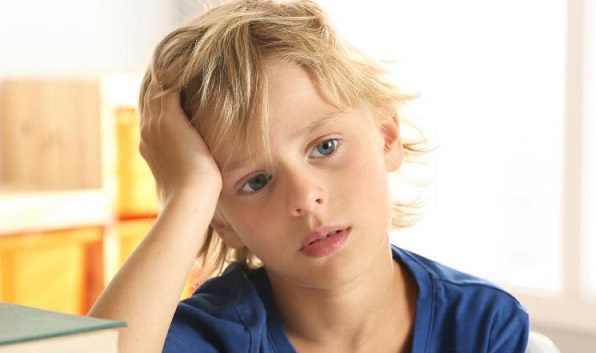COVID-19 negatively affects the emotional development and neuropsychological function of children
Nikhil Prasad Fact checked by:Thailand Medical News Team Aug 14, 2024 7 months, 4 weeks, 2 days, 3 hours, 33 minutes ago
Mental Health: The COVID-19 pandemic has left an indelible mark on the world, with far-reaching effects that extend beyond the immediate health crisis. Among those most affected by the pandemic are children, whose emotional and neuropsychological development has been significantly impacted. A recent study involving researchers from the University of Milan-Italy, the University of Bath-UK, and other prestigious institutions highlights the troubling effects of COVID-19 on the emotional and cognitive well-being of 8- and 9-year-old children. This
Mental Health news report delves into the findings of that study and its implications for children's development during and after the pandemic.
 COVID-19 negatively affects the emotional development and neuropsychological function of children
The Study at a Glance
COVID-19 negatively affects the emotional development and neuropsychological function of children
The Study at a Glance
This comprehensive study, conducted between October and November 2022, involved 40 children aged 8 to 9 years old from the Valtellina and Valchiavenna areas in Northern Italy. The children were divided into two groups: those who had contracted COVID-19 (COVID group or CG) and those who had not (non-COVID group or NCG). The study aimed to identify changes in the neuropsychological and emotional-behavioral development of these children due to the pandemic and related factors such as social isolation, school closures, and distance learning.
Researchers from various institutions, including the Department of Oncology and Hemato-Oncology at the University of Milan, the Foundation IRCCS Ca’ Granda Ospedale Maggiore Policlinico, and the Department of Woman Children and Public Health at the Catholic University of the Sacred Heart, were involved in this study.
Emotional and Behavioral Disruption
The study revealed significant emotional and behavioral disruptions among children who contracted COVID-19. Parents reported a noticeable decline in their children's mood, which was statistically significant within the COVID group. This mood change was characterized by increased irritability, sadness, and a general sense of unease. Many children also exhibited heightened anxiety, fear of infection, and a reluctance to engage in previously enjoyed activities.
This emotional toll was not limited to children who contracted the virus. The Non-COVID group also showed signs of emotional distress, though to a lesser extent. The study suggested that the pandemic's broader impacts, such as social isolation and disrupted routines, contributed to this widespread emotional disturbance.
Cognitive Impact
While the emotional effects were more pronounced, the study also examined the cognitive impact of COVID-19 on children. Researchers used the BVN 5-11 (Neuropsychological evaluation battery for developmental age from 5 to 11 years) to assess various cognitive domains, including attention, memory, verbal recall, planning, and fluency. The results were concerning, especially for the COVID group.
Children in the COVID group showed deficits in attent
ion and memory compared to their non-COVID peers. These cognitive challenges were reflected in difficulties with schoolwork, reduced concentration, and slower processing speeds. Although the study did not find these deficits to reach clinical significance, the trends were clear: COVID-19 negatively affected the cognitive development of children, particularly in areas related to memory and attention.
The Role of Extracurricular Activities
The study also explored the role of extracurricular activities in mitigating the negative effects of the pandemic. Physical activity, reading, and even screen time were examined for their potential to support children's cognitive and emotional well-being. Interestingly, the study found that physical activity had a protective effect, particularly on memory and attention. Children who engaged in regular physical activity during the pandemic were better able to maintain cognitive function compared to those who were more sedentary.
Reading was also found to be beneficial, particularly for developing attentional skills. However, excessive screen time was associated with poorer performance in cognitive tasks, highlighting the importance of balancing screen use with other activities.
Parental Observations and Perceptions
Parents played a crucial role in this study by providing insights into their children's emotional and behavioral changes. The questionnaire administered to parents revealed that many observed significant changes in their children's behavior after the onset of the pandemic. These included increased dependency, more frequent arguments within the family, and a general decline in social interactions.
Interestingly, the study found that parents' perceptions did not always align with the children's actual performance in cognitive tests. This discrepancy suggests that while parents are attuned to their children's emotional and behavioral states, they may not fully grasp the extent of cognitive changes without formal assessment.
Conclusion: A Call to Action
The findings of this study are a stark reminder of the hidden toll the COVID-19 pandemic has taken on children. While the physical health impacts of the virus have been widely discussed, the emotional and cognitive effects on children deserve equal attention. This study highlights the need for targeted interventions to support children's emotional and cognitive development as they continue to navigate the challenges of a post-pandemic world.
The researchers have called for the implementation of developmentally appropriate strategies to mitigate the negative impacts on children's well-being. These strategies should include promoting physical activity, encouraging reading, and providing support for parents to better understand and address their children's cognitive and emotional needs.
The study findings were published in the peer-reviewed Journal of Clinical Medicine.
https://www.mdpi.com/2077-0383/13/16/4768
For the latest
Mental Health news, keep on logging to Thailand Medical News.
Read Also:
https://www.thailandmedical.news/news/doctors-from-turkey-warns-that-children-exposed-to-sars-cov-2-are-at-risk-of-acute-kidney-injury
https://www.thailandmedical.news/news/pediatricians-warn-that-covid-19-can-cause-terminal-ileitis-in-children
https://www.thailandmedical.news/news/understanding-covid-19-s-impact-on-children-s-brains-insights-from-a-three-year-study
https://www.thailandmedical.news/news/breaking-japanese-doctors-warn-of-cerebrospinal-fluid-leakage-linked-to-covid-19-in-children
